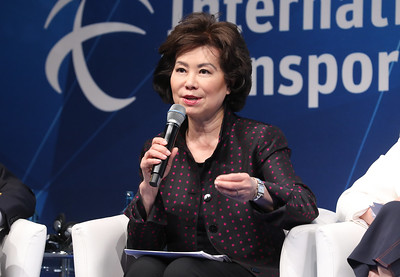
DOT Releases New Guidelines on Autonomous Vehicles
By: Henry Rademacher
On Wednesday, January 9, the Department of Transportation released updated guidelines on automated vehicle regulation. Titled “Ensuring American Leadership in Automated Vehicle Technologies: Automated Vehicles 4.0,” this is the 3rd set of guidelines the DOT has released on automated vehicles since 2017.
DOT Secretary Elaine Chao announced AV 4.0 at the CES Conference in Las Vegas, describing the new policies as a step towards assuring that the United States maintains its position of leadership in automated vehicle technology.
AV 4.0 is a joint initiative between the White House and DOT. According to Secretary Chao, it “unifies AV efforts across 38 different federal agencies and departments.” She added that AV 4.0 “recognizes the value of private sector leadership in AV research, development, and integration.”
Early in her address, Secretary Chao stated that “The histories of innovation and transportation are intertwined.” She pointed out that during the 17th and 18th centuries, technological advances in canal systems and river navigation were important factors in economic growth. In the 19th century, steam engines and locomotives revolutionized the U.S. economy. In the 20th century, the development of the National Highway System and air travel would also provide massive economic benefits to everyday Americans.
Today, automated vehicles are seen by many as the future of transportation. While the technologies are not yet ready for mass deployment, they have the potential to revolutionize the transportation ecosystem.
Secretary Chao stated that automated vehicles have “the potential to save thousands of lives annually and improve quality of life through reduction of traffic congestion, increased productivity, and environmental benefits as well.” She also pointed out that “annual traffic fatalities have declined 33% since 1972,” despite large increases in the number of vehicles on the roads.
Secretary Chao also addressed drones and the DOT’s continued efforts to regulate them in a way that is fair to both consumers and businesses. She stated that there are “1.5 million drones in the sky and over 160,000 remote pilots are now registered with the Federal Aviation Administration. This is a job category that did not even exist five years ago.”
The DOT recently issued a notice of proposed rulemaking for “remote identification of drones” that would apply to all drones over half a pound and require them to be registered with the FAA. The 60-day public comment period for this proposed notice of rulemaking ends on March 2, 2020.
Stressing the extent to which innovation and transportation have been fundamental to the U.S. economy, Secretary Chao used space travel as an example, stating that “six years ago, the U.S. was third behind Russia and China in commercial space launches. Today the U.S. is number one in commercial space launches,” while the “global space economy’s value is approaching 400 billion dollars annually.”
Secretary Chao concluded her address by stating that, “Transportation is going to be as instrumental in America’s future as it has been since our nation’s founding. At the DOT, we are preparing for the transportation system of the future.”
Photo Credit: International Transport Forum (Flickr)